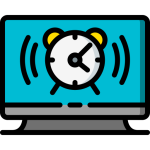
Balancing Screen Time:
Digital Learning vs. Digital Fatigue
GCSE Computer Science learners, you're at the epicentre of a digital revolution. With online platforms, interactive quizzes, and AI tools like aiAnna, your digital resources are vast. But with this immense digital prowess comes the risk of screen fatigue. Let's dive into striking that vital balance.

1. Understand Digital Fatigue
Why It Matters: Hours before a screen can lead to eye strain, headaches, and mental exhaustion. Recognising the symptoms is the first step to combating them.
Action Step: Track your screen hours using ReviseCS's dashboard analytics. Are you consistently exceeding 3-4 hours without a break? Time to recalibrate.

2. The 20-20-20 Rule
Why It Matters: Regular breaks can mitigate the effects of prolonged screen time.
Action Step: Every 20 minutes, glance at something 20 feet away for at least 20 seconds. This short break can drastically reduce eye strain.

3. Physical Environment Optimisation
Why It Matters: Proper lighting and ergonomics play a significant role in reducing digital fatigue.
Action Step: Ensure your study space is well-lit. Adjust screen brightness to match room lighting. Maintain screen height at eye level to avoid neck strain.

4. Diversify Learning Formats
Why It Matters: Not every topic requires screen time. Diversifying resources can break monotony and reduce digital exposure.
Action Step: Alongside digital resources, incorporate physical textbooks, printouts, or handwritten notes into your study routine.

5. Gamify Mindfully
Why It Matters: While gamification on ReviseCS boosts motivation, excessive gaming can increase screen time.
Action Step: Engage in gamified learning in moderation. Use earned coins and ranks as a treat, not a continuous distraction. Remember, the main goal is revision, not just gameplay.

6. Digital Detox Rituals
Why It Matters: Periodic breaks from all screens can refresh your mind and improve focus.
Action Step: Dedicate one evening a week to a digital detox. Engage in offline hobbies, read a physical book, or simply relax and rejuvenate.

7. Use Technology to Fight Fatigue
Why It Matters: Ironically, tech can help reduce digital fatigue. Features like blue light filters or reminders can be allies in your quest for balance.
Action Step: Explore built-in features on your devices to reduce eye strain. Set reminders for breaks or use apps to block access post certain hours, ensuring you aren't overexerting.

8. Listen to Your Body
Why It Matters: Your body will offer signs when it's had enough. Recognising these signals can save you from prolonged fatigue.
Action Step: Experiencing headaches? Eye strain? Mental fog? It's a cue to step back. Take a break, stretch, or perhaps call it a day.
In a nutshell, while digital platforms like ReviseCS offer a treasure trove of learning tools, self-awareness and moderation are key. Embrace the power of digital, but remember to ground yourself in the tangible world. The balance you strike today will determine both your academic success and well-being. Happy revising!
